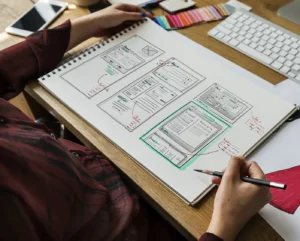Creating a website with DIY tools is a popular solution for small businesses. However, different tools cater to specific business needs. Here’s a detailed look at the main types of DIY web designers, their strengths, and when they are most effective.
Template-Based Designers
Platforms like Wix and Squarespace provide pre-designed layouts, allowing business owners to launch websites quickly. These are ideal for those with minimal design experience who need a professional-looking site.
- Pros: Quick setup, visually appealing templates, no coding required.
- Cons: Limited customization, templates may look similar to competitors, and advanced features may require upgrades.
- Best for: Small retail shops, salons, and businesses displaying basic information.
Drag-and-Drop Designers
Tools like Weebly or Elementor for WordPress provide flexibility by allowing users to drag elements into place without needing to code.
- Pros: Easy control over page layouts, integrates well with e-commerce and service features.
- Cons: Risk of cluttered designs without expertise, advanced features often require payment.
- Best for: Service providers, freelancers, or personal trainers who want control over the layout without advanced technical skills.
E-commerce-Focused Designers
Platforms like Shopify and BigCommerce are designed for businesses that need online stores, with features like payment processing, product catalogs, and order management.
- Pros: All-in-one e-commerce tools, secure payment gateways, and built-in inventory management.
- Cons: Transaction fees and limited customization without coding knowledge.
- Best for: Product-based businesses and local retailers expanding into online sales.
Portfolio and Service-Based Designers
Sites like Format and Squarespace offer visually appealing layouts tailored for service providers or creatives to showcase their work.
- Pros: Sleek designs optimized for portfolios, integrates booking and scheduling tools.
- Cons: Limited scalability, not suitable for complex websites.
- Best for: Photographers, designers, consultants, or professionals who rely on visual storytelling.
Blog-Centered Designers
Platforms like WordPress.com and Blogger cater to businesses focused on content creation and marketing through blogs.
- Pros: Excellent content management tools, easy integration with social media.
- Cons: Limited design customization and challenging optimization for advanced SEO.
- Best for: Coaches, lifestyle brands, or businesses using content marketing to attract leads.
Why DIY Websites May Not Be the Best Long-Term Solution
While DIY tools provide convenience, they come with limitations that can become problematic as your business grows. Many small business owners wear multiple hats—managing operations, marketing, finances, and customer service. Taking on web design adds another layer of responsibility, leading to potential issues.
Limited Customization and Scalability
DIY platforms often have fixed templates and plugins that may not meet evolving business needs. Outgrowing these platforms can result in costly redesigns later on.
Technical Challenges
Troubleshooting plugins, handling updates, and securing the website can be complex. Without technical knowledge, resolving issues can be frustrating and time-consuming.
Time-Consuming Maintenance
DIY websites require ongoing updates and maintenance. Every hour spent on your website could be better used focusing on customers, operations, or marketing.
Basic SEO Tools
While DIY platforms offer some SEO features, they may not provide the depth needed to rank well in competitive markets. A web designer can implement advanced strategies to enhance visibility and performance.
Inconsistent Design and Performance
Without design expertise, DIY sites can suffer from inconsistent layouts, poor navigation, and slow load times, resulting in lower conversion rates and frustrated visitors.
Conclusion
DIY web design tools can be effective for small businesses just starting out. However, as your business grows, the limitations of these platforms may hinder your ability to scale, optimize performance, and compete effectively. With business owners already juggling multiple responsibilities, hiring a professional web designer ensures a scalable, secure, and optimized website. In the long run, a professionally designed site will save time, reduce stress, and provide a strong foundation for business growth.







